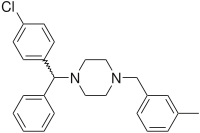
Photo from wikipedia
PURPOSE The treatment options for Lennox-Gastaut syndrome (LGS), a pediatric epileptic syndrome, are limited, especially in younger children. Rufinamide tablets were safe and effective as an add-on treatment in Korean… Click to show full abstract
PURPOSE The treatment options for Lennox-Gastaut syndrome (LGS), a pediatric epileptic syndrome, are limited, especially in younger children. Rufinamide tablets were safe and effective as an add-on treatment in Korean children and adolescents <20 years of age with LGS. This subgroup analysis aimed to evaluate the efficacy and safety of rufinamide tablets in LGS pediatric patients aged 1-4 years. METHODS This was a retrospective, observational study in LGS patients aged 1-4 years who received 12 weeks of treatment with rufinamide orally as an adjuvant treatment between April and June 2010. The proportion of responders (patients with a ≥50% reduction in seizure frequency after rufinamide treatment) was evaluated according to the type of seizure. The proportion of patients who were seizure-free was also evaluated. Adverse events (AEs) were evaluated after 12 weeks of treatment. RESULTS Among the 15 patients evaluated, one discontinued treatment because of worsening seizures 4 weeks after administration of rufinamide. Seven (46.67%) patients were responders and four patients were seizure-free. There were four responders with convulsive seizures, one each for myoclonic seizures and drop attacks, and spasms. The responder rate was increased to 69.23% by long-term treatment of rufinamide. AEs were experienced by three patients. One patient each experienced somnolence, fatigue, and rash. CONCLUSION Rufinamide tablets were efficacious and well tolerated in LGS patients aged 1-4 years, at doses up to 1000 mg per day, when given as add-on therapy to other antiepileptic drugs.
Journal Title: Brain and Development
Year Published: 2018
Link to full text (if available)
Share on Social Media: Sign Up to like & get
recommendations!